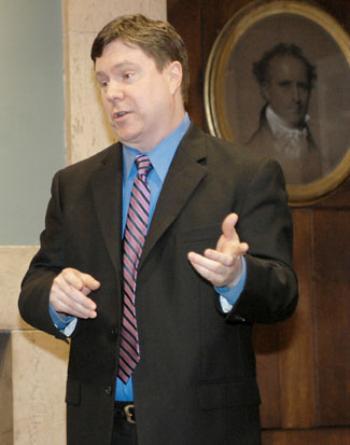
News
When Professors Speak Out, Some Students Stay Quiet. Can Harvard Keep Everyone Talking?

News
Allston Residents, Elected Officials Ask for More Benefits from Harvard’s 10-Year Plan

News
Nobel Laureate Claudia Goldin Warns of Federal Data Misuse at IOP Forum

News
Woman Rescued from Freezing Charles River, Transported to Hospital with Serious Injuries

News
Harvard Researchers Develop New Technology to Map Neural Connections
Dialogue on Nuke Policy Pushed

Student input on issues surrounding nuclear weapons and terrorism is important to aiding the government in coping with nuclear proliferation, according to James Walsh, executive director of the Kennedy School of Government’s Managing The Atom (MTA) project, who spoke last night at an event in the Quincy House Senior Common Room.
Walsh, who focused in his speech on the problems presented by nuclear weapons and terrorism—and the roles and responsibilities of students with regard to these issues—has written a number of articles on the subject, and he recently appeared on network affiliates in the Boston area to offer analysis of the situation in North Korea and Iran.
Last night he presented both the “good news” and the “bad news” about nuclear proliferation, saying that while proliferation itself has been on the decline since the 1960s, the countries who claim to advocate scaling back on the research and production of nuclear weapons are bitterly divided over how to do so.
Walsh also addressed the issue of nuclear terrorism, which he said is limited by the amount of nuclear materials in existence.
“You can only build a bomb with two things which do not exist in nature: highly enriched uranium and plutonium,” Walsh said last night.
Walsh noted that while the cell structure of al Qaeda currently makes it difficult for the group to launch the complex scientific research needed to develop nuclear weapons, the terror network is expanding—and there is a large amount of unsecured nuclear material in the world.
Edward Y. Lee ’08, who attended the talk, said it is important for students to understand the issues of nuclear proliferation and terrorism, especially in modern times.
“We should continually be active and find ways to be involved,” he said prior to the speech.
Walsh said that while “people often feel disconnected” from the nuclear issues that face the country today, he also noted that “we need private actors such as universities to get involved because the government is not a good innovator.”
While he has not always been optimistic about relations between North Korea and the United States, Walsh said that an October 2004 meeting—hosted by Walsh’s group—between North Korean diplomats and Senate Committee staffers led him to feel otherwise.
“There is a possibility that the North Koreans are seriously interested in negotiating,” he said.
The MTA project, which offers students an opportunity to get involved in working groups and research nuclear policy development, consists of about a dozen senior fellows, graduate students, and staff, and between 10 and 15 undergraduate associates per semester.
The undergraduate associates, who led tours of Harvard for the North Koreans during their October visit, enjoy access to scholars of nuclear policy, and have been able to participate in special events such as the North Korean meetings, weekly seminars, and publishing and research opportunities.
“We’ve had success in the past,” said Walsh on nuclear policy making. “It’s a matter of political will and individual effort; if you’re willing to make individual effort, we have a place for you.”
Want to keep up with breaking news? Subscribe to our email newsletter.
